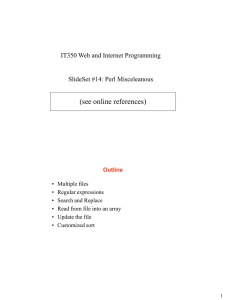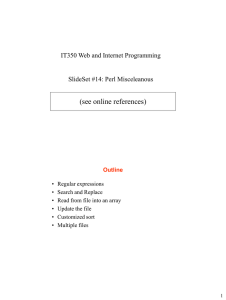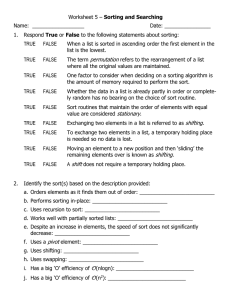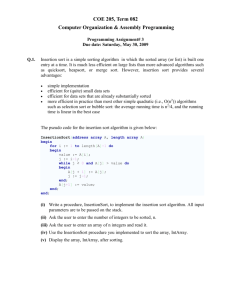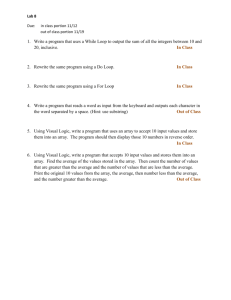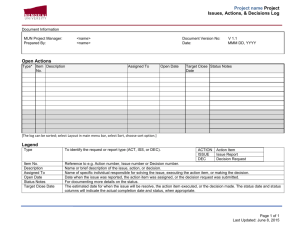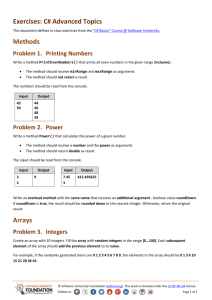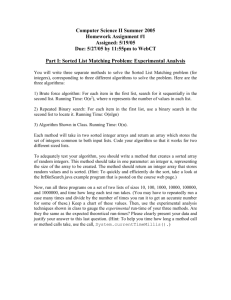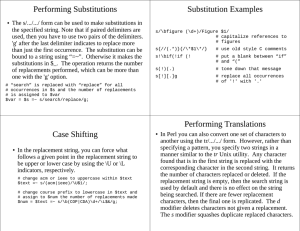(see online references) IT350 Web and Internet Programming SlideSet #14: Perl Misceleanous
advertisement
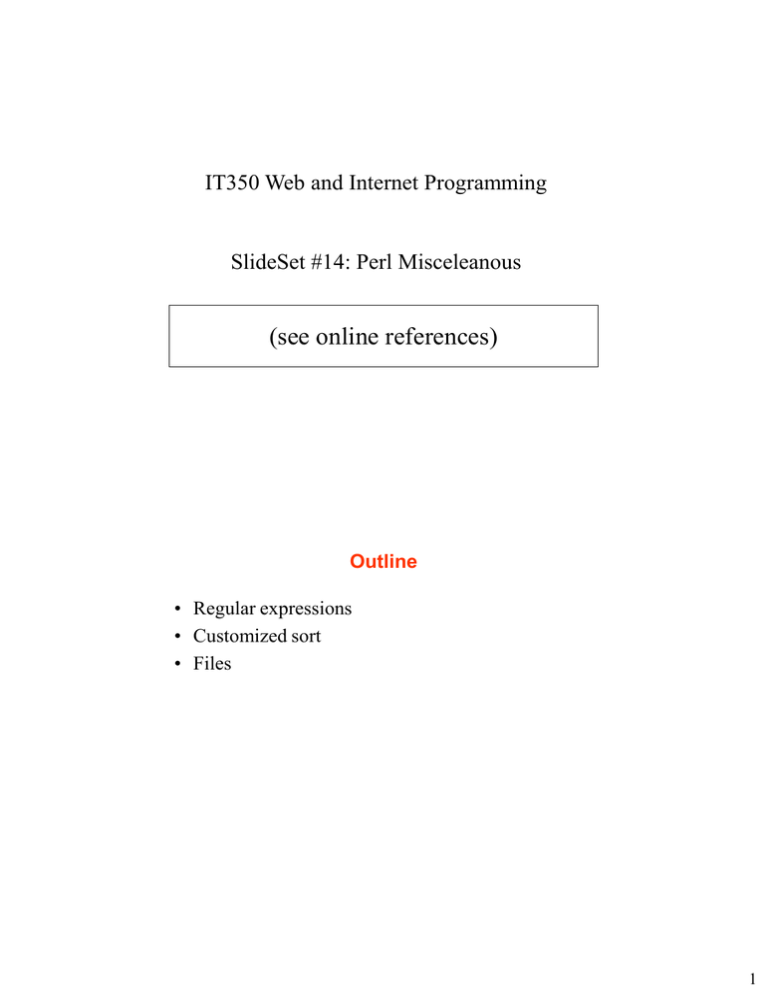
IT350 Web and Internet Programming
SlideSet #14: Perl Misceleanous
(see online references)
Outline
• Regular expressions
• Customized sort
• Files
1
Some Regular Expression Quantifiers and
Metacharactes
Quantifier/Symbol
Matches
{n}
{m,n}
{n,}
+
*
?
^
$
\b
\w
\d
\s
\S
lect_regex.pl
Regular Expressions and Matching Operator
… usual prelude here
my $search = "Now is is the time";
print p("Test string is '$search'");
if ($search =~ /Now/){
print p(‘Search 1 success’); }
if ($search =~ /^Now/){
print p(‘Search 2 success’); }
if ($search =~ /Now$/){
print p(‘Search 3 success’); }
if ($search =~ /\b ( \w+ ow ) \b/x){
print p(“Search 4 success: $1"); }
if ($search =~ /\b ( \w+ ) \s ( \1 ) \b/x){
print p(“Search 5 success: $1 $2"); }
print end_html();
2
Regular Expressions
• Example: /^ a (a|b|c)* b $/x
• Precedence:
Search and Replace
• $string =~ s/regex/replacement/g ;
• Example (replace aa with bb):
• $string = “This string has aa here and aa here”
• $string =~ s/aa/bb/g;
3
Exercise #1
• Write the expression to replace one or more newline
characters in a string with “&&”.
• Make it work for both Unix (\n) and Windows (\r\n)
lect_sort.pl
Sort
… #usual prelude here
my @theList = (4, 1, 2, 6, 93, 2, 65, 100);
print p(“Initial list @theList\n”);
my @theSortedList = sort @theList;
print p(“Sorted list @theSortedList\n”);
my @theNumbersSortedList = sort {$a <=> $b} @theList;
print p(“Sorted list as numbers @theNumbersSortedList\n”);
my @theReversedSortedList = sort {$b <=> $a} @theList;
print p(“Sorted list on reverse @theReversedSortedList\n”);
# $a, $b params: return < 0 if a<b, 0 if a=b, >0 if a>b
sub compareReversed($$){
my ($a, $b) = @_;
return $b-$a;
}
my @theReversedSortedList2 = sort compareReversed @theList;
print p(“Sorted list on reverse @theReversedSortedList2\n”);
print end_html();
4
Exercise #2
my @students = (‘student x in IT350’, ‘student x in IC312’, ‘student y in IT350’,
‘student z in IC312’, ‘student y in IC312’);
my @sortedStudents = ??????????????????
print p join(‘<br/>’,@sortedStudents);
• Complete the code to print the array with content
sorted by CourseID
File Updates
… #standard header stuff here
1. $filename = “myFile.txt”;
2. open (FILE, $filename) or print(“Could not open file
$filename for read”);
3. my @fileLines = <FILE>; #reads entire file into array
4. close (FILE);
5. open (OUTFILE, “> $filename”) or print(“Could not open
file $filename for write”);
6. #read each line and find the one we are looking for
7. my $aLine;
8. foreach $aLine (@fileLines){
9.
chomp ($aLine);
10.
if ($aLine =~ /something/){
11.
#either modify the line and write it to file
12.
#or just skip the line (to delete it from file)
13.
}
14.
else{ print OUTFILE $aLine.”\n”;}
15. }
16. close (OUTFILE);
5
Exercise #3
• Modify precedent code to update the file enrollment.txt
so student x moves from IT350 to SI340
Original enrollment.txt
student x in IC312
student z in IC312
student y in IC312
student x in IT350
student y in IT350
Updated enrollment.txt
student x in IC312
student z in IC312
student y in IC312
student x in SI340
student y in IT350
Multiple Files
Multiple Perl Files:
require “useful_functions.pl";
•
•
•
Be sure not to use same names (e.g., function names) in different files!
The file to include (ex. useful_functions.pl) needs 1; on the last line
When invoking the external function, use & before the function name
–
Ex:
&testFunction();
6
Example of using multiple files
array_functions.pl
#print array as a ul
sub printArrayAsList{
#get array
my @arr = @_;
print '<ul><li>';
print join ('</li><li>', @arr);
print '</li></ul>‘;
}
1;
array_functions_test.pl
#!/usr/bin/perl
use strict;
use CGI qw( :standard );
use CGI::Carp qw(warningsToBrowser
fatalsToBrowser);
require 'array_functions.pl';
print header(); print start_html();
my @array = ('banana', 'apple', 'pear');
print h2('Print array as list');
&printArrayAsList(@array);
print end_html();
7
